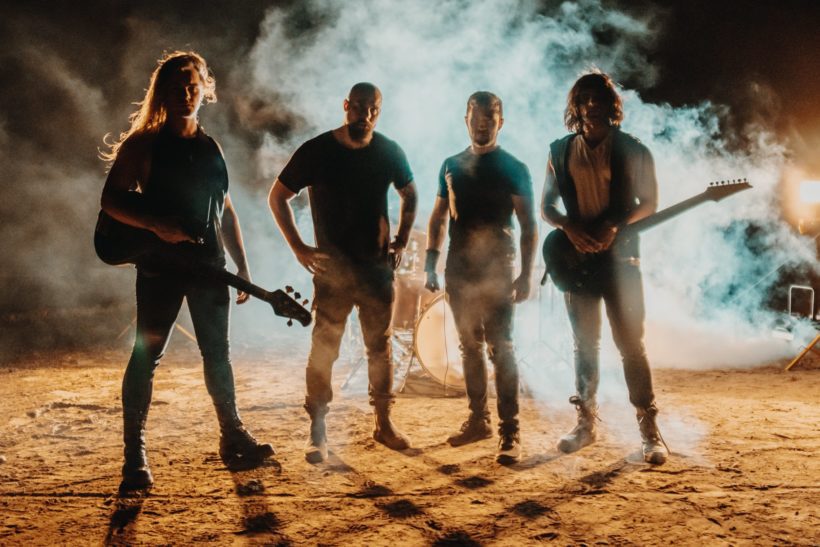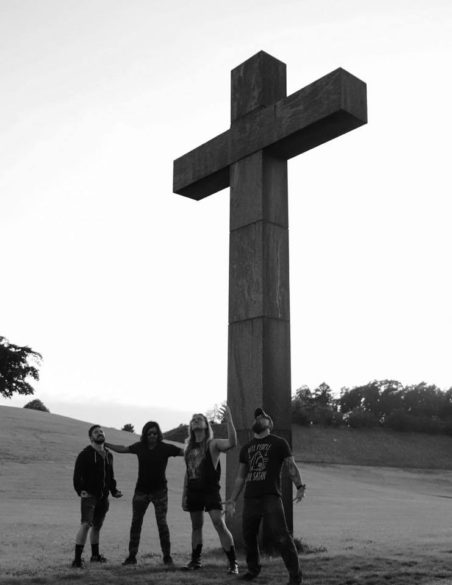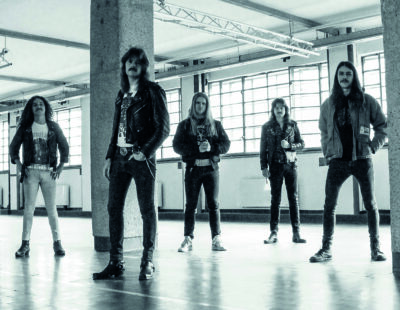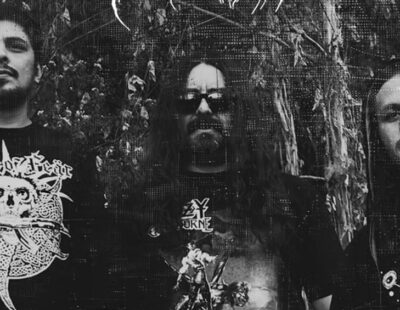
Boston-based The Offering were shepherded by extreme metal luminaries Kelly Shaefer (Atheist) and Shaun Glass (Repentance, ex-Broken Hope) early in their career. The upstarts eventually moved to Florida, where they had hoped to foster a promising heavy metal future following in the footsteps of bands like Cannibal Corpse, Malevolent Creation, and Angelcorpse. The promising heavy metal younglings produced a self-titled independently released EP — later released by Century Media — before packing it up for a return to Beantown. The Offering regrouped, changed out the lineup, with primary songwriters Nishad George and Alexander Richichi recasting songs for their upcoming full-length in their Boston-based forge. But it all could’ve ended earlier had George and Richichi not vowed to continue on in the face of adversity.
While working on new album, Home, the group’s label Century Media offered The Offering a grace period to get their songs in order. This was the spark (and time) that The Offering needed to lay out, reconstruct, and perfect their multi-genre heavy metal attack. Musical, aggressive, and entirely idiosyncratic, The Offering’s music blends, extends, and inverts heavy metal convention. Not harbored in any given genre has, in fact, allowed for The Offering to explore, discover, and re-fashion extreme music to their vision. Certainly, there’s heavy metal, thrash metal, death metal, black metal, hard rock, and even nu metal infused into the group’s technicolor edifice. Songs such as “Ultraviolence,” “Failure (S.O.S),” “Hysteria,” and closing epic “Home” are indicative of The Offering’s musical prowess, adventurous spirit, and courage to transcend genres.
Decibel found Richichi and George at their respective “homes.” There, we chatted about The Offering’s start, their potential, and what went into making their new album, Home. The new wave of American heavy metal has already passed, but there’s never just one wave. The Offering are the beginning of something exciting…
The self-titled EP in 2017 set the tone for The Offering. How have the band grown over the last few years?
Alexander Richichi: Because of our changes in members, it allowed myself and Nish [George; guitars], as primary songwriters, the freedom to write exactly what we want. And the big change is that our intentions went from trying to be another act within some metal sub-genre, like another death metal band or another heavy metal clone, and instead found the courage to focus on the songs themselves and the intention each song is trying to purvey.
What did you not want to do musically (or sonically) on Home that felt right on the EP?
Alexander Richichi: The EP was created to prove to the metal community and industry that we can mimic other metal bands. The whole point was to get people’s attention so we could get funding and the platform, then release a full-length album that we always wanted to, with our own style while taking risks. Personally, it was time for me to find my own voice rather than impersonate the great singers that came before me, and it was my intention to create vocals and melodies that are unmistakably mine.
The full-length was scheduled for a mid-2018 release. Here we are in 2019. What prompted the delay in the release of Home?
Nishad George: It’s interesting you mention that. I think our chemistry with our record label was better as a result of delaying it. I’ll explain. We changed members right as the recording process began, parting ways with our other guitarist and bassist, and that prompted me to approach this album far differently than originally intended. With the creative freedom that came with the lineup change, I chose to revise a lot of the production and make room for more flair like orchestras, modern synths, and, of course more vocal focus for Alex. This lead to us re-tracking a lot of the parts and even adding new songs.
Because we didn’t have a huge budget as an entry level band, we made up for that weakness with sweat hours when it came to post-production — unfortunately, this meant that by the time Fredrik [Nordström] was ready to receive the tracks, we only had about half the album ready to be delivered to him. I was basically pulling all-nighters with an audio team of friends I put together and we still weren’t making the deadline, on top of that, we had a tour coming up. That all changed when we finally gave our A&R something to listen to. Once he heard first batch mixes of “Ultraviolence” and “A Dance With Diana,” I think the label changed their approach with us entirely. They basically said take your time, go on tour, do what you need at your own pacing, because what you’re doing is something very special and unexpected. Things became so accommodating with the timeline that it even allowed for me to fly out to Fredrik’s studio and really get every detail in. If they weren’t that flexible, we probably would’ve rushed so many things that it wouldn’t have turned out great. When our A&R did listen to it, he was like, “How did you make this with that budget?!” It was reassuring that the delay was worth it.
Sounds turbulent yet fortuitous. What were the songwriting sessions like for Home then?
Nishad George: It wasn’t too different from the EP, but I think we were more methodical this time around. I spoke with everyone individually about what they wanted to personally accomplish with this album before the process started. It then began with me drafting demos to try and capture those intentions and then giving them to Alex to sing on it. Alex and I were far more in sync than on the EP, which helped, because we were always exchanging opinions from his conception to his final vocal take for cohesive purposes. I constantly changed the music underneath what he’d give me because he came up with great ideas, and I wanted to put exclamation points on them.
After that, I brought in Steve because he has a great mind for song flow, and then held a couple weeks of jam sessions. Afterwards, we ironed out our pre-production to a point where Steve [Finn; drums] knew “key” moments to sync up to, but we never went beyond that level of detail because I felt there needed to be room for the lightning in the bottle. This happens a lot with Alex, where I’ll often use something he demos as the final take. It’s rock ‘n’ roll at the end of the day, everyone should have some moments to go off script. If anything surprised me afterwards, I’d just change my guitar part, Spencer’s bass, or the synthesizers to help sit the changes in.
Nishad George: “Song” is exclusively what the listener hears and how they can interpret it. For us, it’s forgetting everything we’ve learned as players and learning how to converse with others as humans. It’s easy to get caught up with technical prowess in metal… it’s a challenging genre after all, but it isn’t our intention to soullessly wail and noodle, because we’re trying to give people an experience or a window of escape from their lives. There are so many songs I’ve listened to growing up that I’ve revisited to dissect with fresh ears, and I discover something new every time. I want our songs to have that kind of limitless depth where people can explore them all day and still find something new tomorrow.
Lyrically, things on Home aren’t terribly bright and sunny. What’s happening on Home?
Alexander Richichi: Over the last few years, I have noticed a trend of escapism in metal. Bands using the same gimmicks and key words to provoke weak-minded metal followers to keep buying t-shirts that say “Odin” or “Dragon,” or “Fight.” I grew sick and tired of watching a once honest counter culture of anti-authority free spirits bend the knee to key words and fake leather. So I decided to write honestly. I decided to allow myself to be vulnerable enough to share the root of my own anxieties, write consciously on personal past and modern events, and esoterically criticize and analyze my own being for audiences to hear. It’s about feeling small, inconsequential, forgotten, wasted, and questioning how you fit in. My attempt is to see if anyone feels the same anymore. Or am I the only one? And if I’m not, where did everyone go?
And, wait, the title Home is supposed to be HOME. What’s going on with the title and the capitalization of the word?
Alexander Richichi: Lyrically, in this band, no word has one meaning – including HOME. Home is meant to be a haven, but instead it’s often the root of our traumas. We try not to think about what home we’re born into and how it’s tied to our fate, and how we are ultimately a reflection of our home, our upbringing. It shows us our limitations, how we interpret “safety.” I would like this album to be a “home” that houses people of the same mind, those who can find it as a type of refuge, especially in 2019 where so many of these emotions aren’t accessible to be openly talked about with loved ones. HOME is meant to show that you’re not alone.
Do you think the lyrics go hand-in-hand with the music or are the lyrics a reflection of the musical sentiment? Pairing can be hard, especially when the music is too good to scrap.
Alexander Richichi: Definitely hand-in-hand. Nish and I have a relationship where our intentions are the same. We’re so good at bouncing ideas off of each other that our work is always cohesive. One piece is not written without another. We take two steps forward then review one step back, always together. That’s how we make music that’s better than we could make individually — we understand that this process only works as a whole.
Describe the tracking sessions at Carriage House Studios.
Nishad George: It was a blast. We do our auxiliary instruments and drums at studios when we record, but it’s really a toy store for me and a nonstop concert of Steve bashing the drums like an animal for the rest of us. I would basically wake up a few hours before the guys, scavenge this awesome, almost haunted, LA-style studio for crazy auxiliary instruments to record for layers, and then, once Steve woke up, I’d run him for 12-16 hours on the set. That isn’t an exaggeration at all. We were so pumped on adrenaline in a museum loaded with music history and vintage gear that we couldn’t sit still. We found photobooks of when Pantera was in the studio and some awesome signed records by Diana Ross and Rakim… we even found Abe Cunningham’s drum set that he used on Deftones’ Around The Fur and used it during the trance part on “A Dance with Diana.” I had Steve’s drum kit set up in the same spot Vinnie Paul did for Cowboys from Hell because it coincidentally was the best sounding position in the room. Go figure.

How did Fredrik Nordström come into the picture? He seemed to have enjoyed his involvement in your music on Home.
Nishad George: Fredrik is one of the few mix engineers in preset-driven metal where his albums sound completely different from one another — he’s made a lot of trend-setting albums that I love. He was the first guy I spoke with and the first guy to say yes.
He was expecting work similar to the EP and charged us as much, so of course he flipped out when he got the sessions for Home which have 100-150 tracks per song. We had maxed out his charged time by the second song, but the crazy, most admirable thing was that he never asked us for a cent more. That crazy old man viewed our album as a challenge because he’s that dedicated to his craft. He had asked me to come to Gothenburg and go over revisions in person because he was having nightmares ironing out the sessions. He’s such a funny, upbeat joker that once I got there, I had forgotten that I was jet lagged nine hours. Through all of our laughs and debates, I appreciated his casual honesty — he never held back an insult or a compliment on the music, so I always knew he was genuine. He was also very relaxed about my mix notes… he even let me continue to mix when he was out of the studio. Honestly, engineers like him are rare — after all of his experience, he isn’t jaded, and he’s still looking to be a part of the newest wave, saying that our album was a kick in the ass that he needed.
And tell me about the cover art. Who did it? What’s it trying to communicate? The EP was dark and quasi- or actually religious in context.
Alexander Richichi: We made an album cover first before we finished the record, and the album cover actually didn’t work with the final sound of the album. Our team at Century Media suggested a more nature driven theme and they were able to find this awesome artist, Dawid Planeta, with which we immediately clicked with. He is a Polish artist whose themes cover mental illness, so it just worked with our message for HOME.
Which songs on Home are speaking to The Offering right now? The singles so far are: “Failure S.O.S.,” “Ultravoilence,” and “Lovesick.”
Nishad George: The title track for me, just because I think that’s the definition of creative freedom. Our label didn’t limit it, and my bandmates had no qualms with working on a 14-minute song with ballads and a full orchestra. There are over 100 instruments and vocals on that song alone; hopefully one of these days I’ll deconstruct it in a video so everyone can see how much detail is packed under the hood.
Alexander Richichi: I agree with Nish on this one. It’s because it shows the entire emotional spectrum that the Offering is capable of doing. I am personally proud of this song the most because of the range of textures and emotional degrees I was able to perform.
What do you think fans will think of The Offering after hearing Home (or seeing the band on tour for it)?
Alexander Richichi: I think we will polarize the metal community. I hope that we are so different and so unique that people fear how different we are. I think we are so new and it is because we focus so strongly on the songwriting itself that other metal sub-genre followers will see us as “not metal.”
Nishad George: We can only hope for the best with how it’s received… it’s a bit unconventional for today’s audience as we made an 8-song, 52-minute record like the classic vinyl experience. We have a couple tours in the works and some plans for digital content relating to the album. There’s so much to unpack on this album that I really want us to do it justice before we buckle in for the next one.
** The Offering’s new album, Home, is out now on Century Media Records. Adventurous metalheads can get the CD or CD+t-shirt HERE. Don’t sleep on The Offering, folks!






